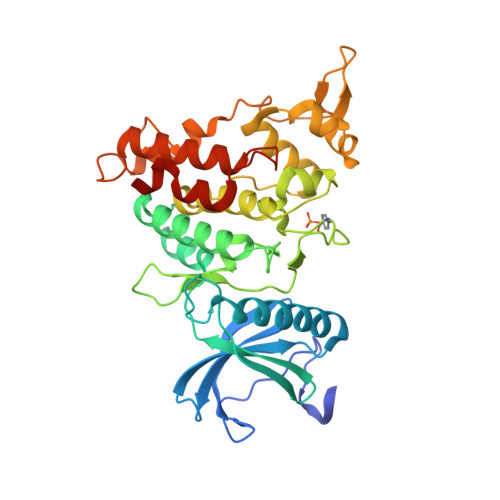Discovery and Functional Characterization of a Potent, Selective, and Metabolically Stable PROTAC of the Protein Kinases DYRK1A and DYRK1B.
Wilms, G., Schofield, K., Maddern, S., Foley, C., Shaw, Y., Smith, B., Basantes, L.E., Schwandt, K., Babendreyer, A., Chavez, T., McKee, N., Gokhale, V., Kallabis, S., Meissner, F., Rokey, S.N., Dunckley, T., Montfort, W.R., Becker, W., Hulme, C.(2024) J Med Chem 67: 17259-17289
- PubMed: 39344427
- DOI: https://doi.org/10.1021/acs.jmedchem.4c01130
- Primary Citation of Related Structures:
8T2H - PubMed Abstract:
Small-molecule-induced protein degradation has emerged as a promising pharmacological modality for inactivating disease-relevant protein kinases. DYRK1A and DYRK1B are closely related protein kinases that are involved in pathological processes such as neurodegeneration, cancer development, and adaptive immune homeostasis. Herein, we report the development of the first DYRK1 proteolysis targeting chimeras (PROTACs) that combine a new ATP-competitive DYRK1 inhibitor with ligands for the E3 ubiquitin ligase component cereblon (CRBN) to induce ubiquitination and subsequent proteasomal degradation of DYRK1A and DYRK1B. The lead compound (DYR684) promoted fast, efficient, potent, and selective degradation of DYRK1A in cell-based assays. Interestingly, an enzymatically inactive splicing variant of DYRK1B (p65) resisted degradation. Compared to competitive kinase inhibition, targeted degradation of DYRK1 by DYR684 provided improved suppression of downstream signaling. Collectively, our results identify DYRKs as viable targets for PROTAC-mediated degradation and qualify DYR684 as a useful chemical probe for DYRK1A and DYRK1B.
- Institute of Pharmacology and Toxicology, RWTH Aachen University, Wendlingweg 2, 52074 Aachen, Germany.
Organizational Affiliation:




















